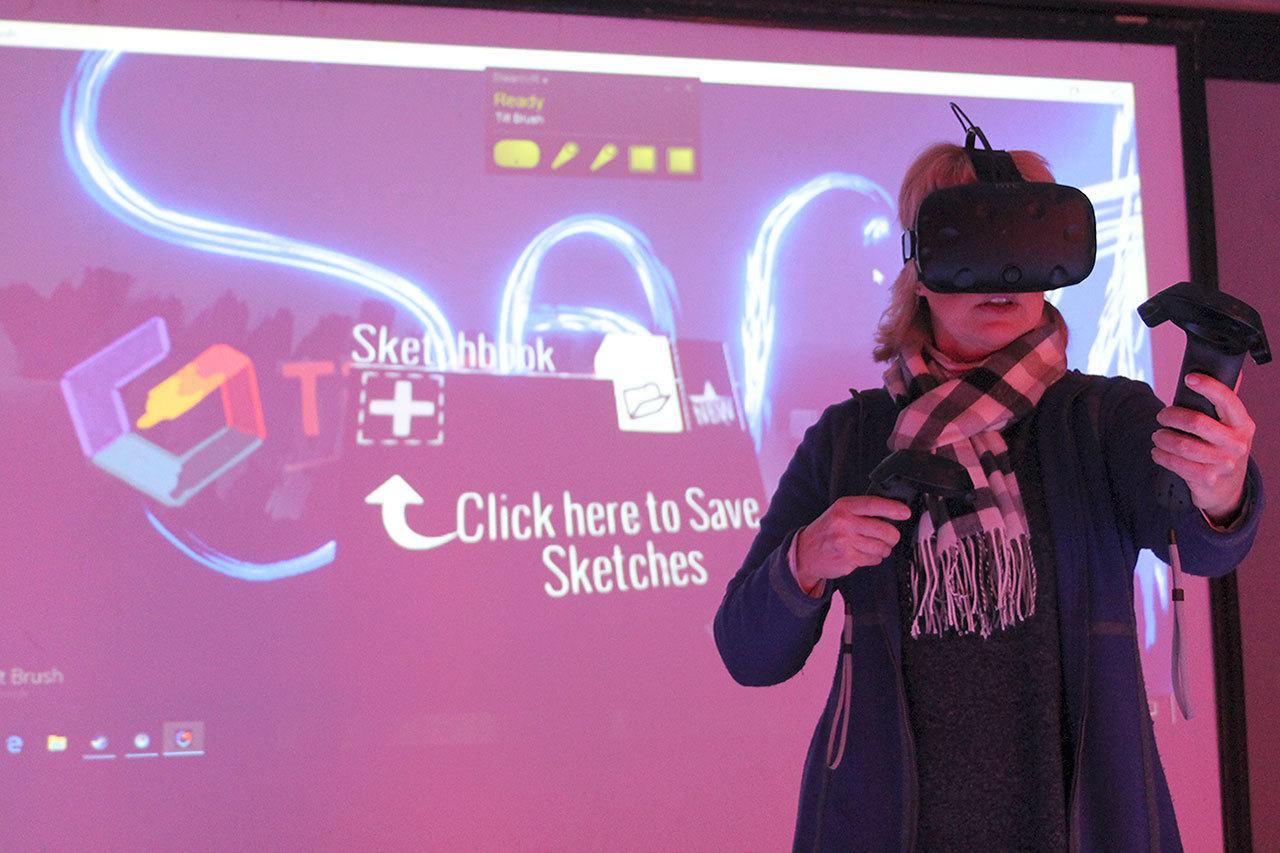In the rapidly-changing world of video games, gaming and tech companies are always trying to find ways to stay ahead of the curve.
And for Clinton-based tech startup company Console Killer Technologies (CK Tech), the way forward is virtual reality.
“No one virtual reality experience is the same,” owner Ethan Bishop said. “Everyone does something different since you’re not as limited as you are with a screen. I’ve played all of these games multiple times and every day I’ve seen something different.”
Bishop is hosting virtual reality beta testing this week and next at The Machine Shop in Langley. The beta testing gives people young and old on South Whidbey a rare chance to dive headset first into a virtual world. The technology, which was created by the Bellevue-based Valve Corporation, has only been on the market for less than a year. The Machine Shop is one of three locations in the state that are offering virtual reality to customers.
Upon walking into the pinball arcade on Second Street, one can find a 12-by-15 foot area outlined by floor lights designated for a virtual reality space. A headset and two controllers lie on the floor, waiting for someone to give the advanced technology a shot. The game is projected onto the wall so others can watch what the gamer is doing in the virtual world. A group of people can often be seen watching from the side in wonderment, hesitant to put on the headset. Many fear motion sickness and the idea of how new and advanced the technology is.
“I’ve had so many people be skeptical, but every person has walked out talking about how amazing it is and that they didn’t expect it,” Bishop said. “It’s so immersive. You have two senses covered: eyes and ears.”
Upon putting on the headset, a gamer is fully engulfed in whatever game they choose to play. It’s disorienting at first, but it’s easy to adapt within a minute or two. A gamer starts with a room that operates as a menu where one can select a game or activity. They can then choose to play a fighter pilot game, paint in three dimensions or even teleport anywhere in the world using data from Google Earth.
“There have been a good amount of people who have come in and had their minds blown,” Machine Shop owner Tim Leonard said. “The younger people caught right on and knew how to navigate through the different parts of the program. The older crowd needed a bit more time to get used to the hardware.”
When Bishop left Oculus with a couple of friends two years ago, he stayed in touch with his former colleagues. The company has since sent him its virtual reality technology so he could develop his own hardware to complement the game, such as modifications to controllers. He has since rented out time to people who want to try the virtual reality technology.
Bishop can set up the virtual space in homes or invite people over to his home to give it a shot. He’s currently offering the first five minutes for free, with $1 charged per following minute. It costs $50 to play for an hour, and $45 if the hour is prepaid by 24 hours.
“I’ve been doing demos from home for some time now, but this is the first time I’ve taken it to a business space and let their customers try it out,” Bishop said.
If all goes well, the beta testing will continue into next week from Thursday to Sunday. Bishop also plans to bring the technology to Whidbey Telecom’s new Gigabit space on Second Street and Anthes Avenue in Langley, where customers can try out more functional activities such as sculpting and design.
Bishop has two end goals. He said he would “love” to someday set up a permanent virtual reality area, but his hopes transcend gaming. He also wants to use it as an educational tool for kids to learn about things such as the solar system.
“I want to get funding so I can go to schools or bring the schools here,” Bishop said. “For example, the solar system game I have uses actual sizes and proportions of the planets and the sun. I never got a grasp of how big the sun was until I was 30 years old trying out this game.”



